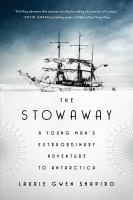Antarctica or “Antarktikos” was imagined to exist by Ancient Greek and Roman philosophers who supposed there must be a “counter balance” to the top heavy Northern Hemisphere and the Great Bear constellation of “Arktos” above the North Pole (now known as the Big Dipper). But, Polynesian oral narratives of voyaging suggest that it may have been the Māori people who first set eyes on Antarctic waters, and possibly even the continent, in the 7th century CE. Once Western European explorers began to compete to be “first discoverers” just 200 years ago, official records were kept of the successes and failures of each voyage. While Captain James Cook crossed the Antarctic Circle and circumnavigated the continent twice in the latter half of the 18th century, he was prevented from actually sighting land due to pack ice. It wasn’t until the 1820’s that Antarctica was actually spotted and recognized as a continent by Lt. Charles Wilkes.
Eventually, in 1912, Roald Amundsen and four companions became the first explorers to reach the geographic South Pole by skis and sled dogs. It was a 1,600 mile round trip that took 99 days. Once the Antarctic Treaty was initially signed in 1961, the continent was reserved for peaceful and cooperative scientific research. This has resulted in such discoveries as land mammal fossils (first found in March 1982) and plant life (such as ferns) that prove the continent was in a much more temperate climate zone in eons past.
If you are interested in reading more about true adventures to the Antarctic region, check out these NON-FICTION titles (or view the Frozen Planet DVDs):
Or, if you prefer to be enthralled by a FICTIONAL adventure to Antarctica, take a look at these books:
NON-FICTION LINKS:
The ship beneath the ice : the discovery of Shackleton’s Endurance by Mensun Bound
The Endurance : Shackleton’s legendary Antarctic expedition by Caroline Alexander
Madhouse at the end of the Earth : the Belgica’s journey into the dark Antarctic night by Julian Sancton
The impossible first : from fire to ice–crossing Antarctica alone by Colin O’Brady
Iced in : ten days trapped on the edge of Antarctica by Chris Turney
The stowaway : a young man’s extraordinary adventure to Antarctica by Laurie Gwen Shapiro
Dinosaurs rediscovered : the scientific revolution in paleontology by M. J. (Michael J.) Benton
FICTION LINKS:
Cold people : a novel by Tom Rob Smith
Fast ice : a novel from the Numa files by Clive Cussler
All the white spaces : a novel by Ally Wilkes
Whiteout by Adriana Anders
South Pole Station : a novel by Ashley Shelby
Midnight by Amy McCulloch
Beyond the ice limit : a Gideon Crew novel by Douglas J. Preston
The Split by S. J. Bolton


















